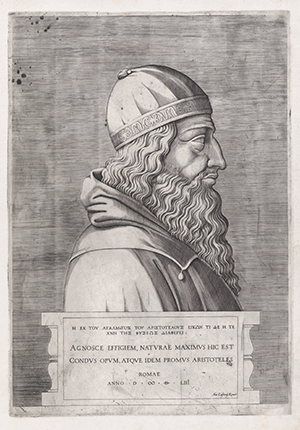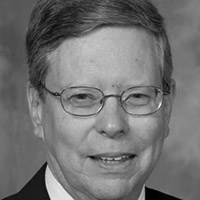Historic Document
Nicomachean Ethics (ca. 340 BC)
Aristotle | 340 BC

The Metropolitan Museum of Art, New York, Harris Brisbane Dick Fund, 1941
Summary
Aristotle (384-22 BC) was a political theorist and author of The Nicomachean Ethics, The Politics, and many other influential philosophical works. In his Nicomachean Ethics, Aristotle famously defined happiness as an “activity of soul in conformity with excellence,” or virtue. The Greek word for happiness was “eudaimonia”—perhaps best understood as “human flourishing.” The Founders drew on Aristotle’s definition of happiness when shaping their own lives and the life of the young American republic. Rather than seeking immediate gratification, the Founders believed that happiness required all of us to check our unproductive impulses in the short term so that we could improve our character, achieve our potential, and serve others over the long term. They urged us to use our powers of reason to control our unreasonable passions and emotions. However, this did not mean that they expected us to banish all emotion from our lives. Instead, the Founders called on us to manage our emotions in positive and virtuous ways.
Selected by

Paul Rahe
Professor of History and Charles O. Lee and Louise K. Lee Chair in the Western Heritage at Hillsdale College

Jeffrey Rosen
President and CEO, National Constitution Center

Colleen A. Sheehan
Professor of Politics at the Arizona State University School of Civic and Economic Thought and Leadership
Document Excerpt
Let us again return to the good we are seeking, and ask what it can be. It seems different in different actions and arts; it is different in medicine, in strategy, and in the other arts likewise. What then is the good of each? Surely that for whose sake everything else is done. In medicine this is health, in strategy victory, in architecture a house, in any other sphere something else, and in every action and choice the end; for it is for the sake of this that all men do whatever else they do. Therefore, if there is an end for all that we do, this will be the good achievable by action, and if there are more than one, these will be the goods achievable by action. So the argument has by a different course reached the same point; but we must try to state this even more clearly. Since there are evidently more than one end, and we choose some of these (e.g. wealth, flutes, and in general instruments) for the sake of something else, clearly not all ends are complete ends; but the chief good is evidently something complete. Therefore, if there is only one complete end, this will be what we are seeking, and if there are more than one, the most complete of these will be what we are seeking. Now we call that which is in itself worthy of pursuit more complete than that which is worthy of pursuit for the sake of something else, and that which is never desirable for the sake of something else more complete than the things that are desirable both in themselves and for the sake of that other thing, and therefore we call complete without qualification that which is always desirable in itself and never for the sake of something else. Now such a thing happiness, above all else, is held to be; for this we choose always for itself and never for the sake of something else, but honour, pleasure, reason, and every excellence we choose indeed for themselves (for if nothing resulted from them we should still choose each of them), but we choose them also for the sake of happiness, judging that through them we shall be happy.
Happiness, on the other hand, no one chooses for the sake of these, nor, in general, for anything other than itself. From the point of view of self-sufficiency the same result seems to follow; for the complete good is thought to be self-sufficient. Now by self-sufficient we do not mean that which is sufficient for a man by himself, for one who lives a solitary life, but also for parents, children, wife, and in general for his friends and fellow citizens, since man is sociable by nature. But some limit must be set to this; for if we extend our requirement to ancestors and descendants and friends’ friends we are in for an infinite series. Let us examine this question, however, on another occasion; the self-sufficient we now define as that which when isolated makes life desirable and lacking in nothing; and such we think happiness to be; and further we think it most desirable of all things, without being counted as one good thing among others—if it were so counted it would clearly be made more desirable by the addition of even the least of goods; for that which is added becomes an excess of goods, and of goods the greater is always more desirable. Happiness, then, is something complete and self-sufficient, and is the end of action. Presumably, however, to say that happiness is the chief good seems a platitude, and a clearer account of what it is is still desired. This might perhaps be given, if we could first ascertain the function of man. For just as for a flute-player, a sculptor, or any artist, and, in general, for all things that have a function or activity, the good and the ‘well’ is thought to reside in the function, so would it seem to be for man, if he has a function. Have the carpenter, then, and the tanner certain functions or activities, and has man none? Is he naturally functionless? Or as eye, hand, foot, and in general each of the parts evidently has a function, may one lay it down that man similarly has a function apart from all these? What then can this be? Life seems to be common even to plants, but we are seeking what is peculiar to man. Let us exclude, therefore, the life of nutrition and growth. Next there would be a life of perception, but it also seems to be common even to the horse, the ox, and every animal. There remains, then, an active life of the element that has a rational principle (of this, one part has such a principle in the sense of being obedient to one, the other in the sense of possessing one and exercising thought); and as this too can be taken in two ways, we must state that life in the sense of activity is what we mean; for this seems to be the more proper sense of the term.
Now if the function of man is an activity of soul in accordance with, or not without, rational principle, and if we say a so-and-so and a good so-and-so have a function which is the same in kind, e.g. a lyre-player and a good lyre-player, and so without qualification in all cases, eminence in respect of excellence being added to the function (for the function of a lyre-player is to play the lyre, and that of a good lyre-player is to do so well): if this is the case, and we state the function of man to be a certain kind of life, and this to be an activity or actions of the soul implying a rational principle, and the function of a good man to be the good and noble performance of these, and if any action is well performed when it is performed in accordance with the appropriate excellence: if this is the case, human good turns out to be activity of soul in conformity with excellence, and if there are more than one excellence, in conformity with the best and most complete.




